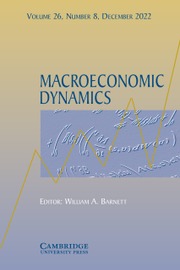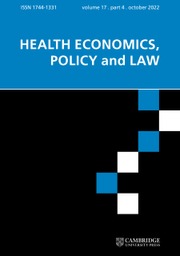The Cambridge Handbook on the Economics of Terrorism
Since the turn of the century, few issues have shaped political debate and policy-making more than terrorism. As a result, there has been a huge increase in the amount of academic research devoted to investigating the causes and consequences of terrorism. The Cambridge Handbook on the Economics of Terrorism is the first to present a state-of-the art survey of the economics of terrorism. It adopts a rational-choice perspective according to which terrorists are viewed as rational economic actors and presents a framework for analyzing the causes and consequences of terrorism. It explores the causes and consequences of terrorism and shines a light on practical counterterrorism policies and their trade-offs. With contributions from many leading figures in this fast-growing and important field, this book offers an accessible yet comprehensive collection of the economic analysis of terror.
- Provides an encompassing reference source and a very good introduction to the field
- Offers a concise survey of the issues and the literature
- Features well-regarded contributing authors. It is a who-is-who of the economics of terror research
Reviews & endorsements
‘This handbook offers a comprehensive source for understanding the economic approach to the analysis of terrorism. It explores the causes and consequences of this phenomenon in a systematic way and in great detail. Its impressive collection of studies covers a wide range of aspects regarding terrorism, from its history and measurement to its determinants and its political, economic, and social effects. Anybody interested in this topic has a lot to learn from this book. Atin Basuchoudhary and Günther G. Schulze deserve much praise for editing this excellent volume.’ Esteban Klor, The Rosita Herczeg Professor of Economics at The Hebrew University of Jerusalem
‘The Cambridge Handbook of the Economics of Terrorism provides a comprehensive overview of the economic causes and consequences of terrorism. Featuring cutting edge research using a variety of methodologies, this compendium surveys important contributors to terrorism such as individual economic factors, migration, social media, and religion while also discussing the effects of terrorism on trade, economic growth, tourism, insurance markets, state budgets, citizen behavior, elections and democracy and general social cohesion. The handbook also draws together important scholarship on the economics of terrorism to discuss implications for counterterrorism policy and ethical practices. Written from a variety of perspectives, the handbook enables readers to gain a better understanding of the state of the field of scholarship on the economics of terrorism. The Cambridge Handbook of the Economics of Terrorism belongs on the bookshelves of any serious student or scholar of terrorism.’ James A. Piazza, Liberal Arts Professor of Political Science, The Pennsylvania State University
‘The Cambridge Handbook of the Economics of Terrorism is a tour de force, a masterful work that will challenge your assumptions and deepen your understanding of this complex and pressing global issue. It is a must-read for policymakers, academics, and anyone seeking to make a difference in the fight against terrorism.’ Arnel P. David, NATO Supreme Headquarters Allied Powers Europe
‘As ‘Great Power Competition’ and attritional warfare in Europe consume defense planners, terrorism remains a key threat to democratic societies. Atin Basuchoudhary and Günther G. Schulze have gathered the brightest economic minds to update, in a single volume, the state of research on the economics of terrorism. Students of defense economics, terrorism, and economics more broadly should have this volume on their bookshelf.’ Jordan Becker, United States Military Academy, West Point
Product details
August 2025Hardback
9781108834025
794 pages
244 × 170 mm
Not yet published - available from August 2025
Table of Contents
- Part I. Concepts and Organizing Principles:
- 1. Introduction: The Economic Approach to the Analysis of Terrorism Atin Basuchoudhary and Günther G. Schulze
- 2. Terrorism: What We Know, What We Don't Know, and What We Need to Know Todd Sandler and Khusrav Gaibulloev
- 3. Terrorism: A Brief History William F. Shughart II
- 4. Measuring Terrorism with Event Databases Gary LaFree and Michael Becker
- 5. Counting Every Body – Determining the Global Burden of Terrorism and Armed Conflict Anke Hoeffler
- 6. Organizing Terrorism Jacob N. Shapiro, Margaret J. Foster and David A. Siegel
- 7. Theories of Terrorism Atin Basuchoudhary and Gary M. Shiffman
- Part II. Determinants of Terrorism:
- 8. Individual Determinants of Terrorism Claude Berrebi and Owen Engel
- 9. The Economics of Suicide Terrorism and the Curious Case of Sri Lanka Mia M. Bloom
- 10. Economics, Psychology and Terrorism Max Taylor
- 11. Lock, Stock & Barrel Reloaded Martin Gassebner and Tobias Korn
- 12. Machine Learning Approaches to Understanding Global Trends and Causal Determinants of Terrorism James T. Bang and Aniruddha Mitra
- 13. Migration and Terrorism Tim Krieger
- 14. The Economics of Terrorism and Social Media Kweku A. Opoku-Agyemang
- 15. Religion and Terrorism: The Religious Utility Hypothesis Jean-Paul Carvalho
- 16. Cost Benefit Decision-Making & Lone-Actor Terrorism Paul Gill and Zoe Marchment
- Part III. Consequences of Terrorism:
- 17. Macroeconomic Consequences of and Economic Resilience to Terrorism Daniel Meierrieks
- 18. Trade Effects of Terrorism Subhayu Bandyopadhyay and Javed Younas
- 19. Terror Attacks and Threats, Wars and Stock Market Volatility in the G7 Countries: A Century of Evidence from a Time-Varying Nonparametric Panel Data Model of Geopolitical Risks Elie Bouri, Oguzhan Cepni, Rangan Gupta and Naji Jalkh
- 20. Tourism Valentin Klotzbücher and Günther G. Schulze
- 21. Insurance Stephen Johnson
- 22. Terror and its Fiscal Consequences Benedict Clements, Sanjeev Gupta, João Tovar Jalles and Saida Khamidova
- 23. Terrorism, Voting Behavior, and Political Attitudes José G. Montalvo
- 24. The Complex Relationship between Democracy and Terrorism Dennis M. Foster, Benjamin A. Kleinerman and Howard Sanborn
- 25. Terrorism and Social Cohesion Günther G. Schulze
- Part IV. Counterterrorism:
- 26. The Counterterrorism Policies of Deterrence and Preemption Jingxian Chen and Kevin Siqueira
- 27. Game Theoretic Models Daniel Arce
- 28. Offensive Counterterrorism: Lessons from Israel Efraim Benmelech
- 29. War, Terrorism and Science and Technology R. E. Burnett and Carly Philpot
- 30. The Financing of Terrorism Friedrich Schneider
- 31. Foreign Aid as a Counterterrorism Tool Amira Jadoon
- 32. Evaluating the Effectiveness of Measures to Counter Domestic Terrorism John Mueller and Mark G. Stewart
- 33. Ethics of Counterterrorism Duncan Richter
- Part V. Concluding Issues:
- 34. When is Terrorism Successful? Peter Krause
- 35. Twenty-first-Century Terrorism Eli Berman.








